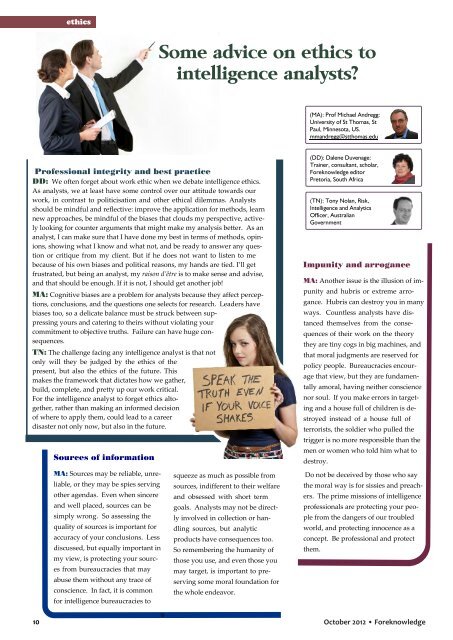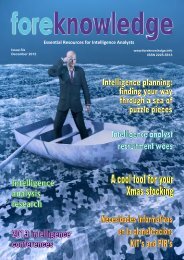Download in PDF (2MB) here - Foreknowledge
Download in PDF (2MB) here - Foreknowledge
Download in PDF (2MB) here - Foreknowledge
Create successful ePaper yourself
Turn your PDF publications into a flip-book with our unique Google optimized e-Paper software.
ethics<br />
Sources of <strong>in</strong>formation<br />
MA: Sources may be reliable, unre-<br />
liable, or they may be spies serv<strong>in</strong>g<br />
other agendas. Even when s<strong>in</strong>cere<br />
and well placed, sources can be<br />
simply wrong. So assess<strong>in</strong>g the<br />
quality of sources is important for<br />
accuracy of your conclusions. Less<br />
discussed, but equally important <strong>in</strong><br />
my view, is protect<strong>in</strong>g your sourc-<br />
es from bureaucracies that may<br />
abuse them without any trace of<br />
conscience. In fact, it is common<br />
for <strong>in</strong>telligence bureaucracies to<br />
Some advice on ethics to<br />
<strong>in</strong>telligence analysts?<br />
Professional <strong>in</strong>tegrity and best practice<br />
DD: We often forget about work ethic when we debate <strong>in</strong>telligence ethics.<br />
As analysts, we at least have some control over our attitude towards our<br />
work, <strong>in</strong> contrast to politicisation and other ethical dilemmas. Analysts<br />
should be m<strong>in</strong>dful and reflective: improve the application for methods, learn<br />
new approaches, be m<strong>in</strong>dful of the biases that clouds my perspective, actively<br />
look<strong>in</strong>g for counter arguments that might make my analysis better. As an<br />
analyst, I can make sure that I have done my best <strong>in</strong> terms of methods, op<strong>in</strong>ions,<br />
show<strong>in</strong>g what I know and what not, and be ready to answer any question<br />
or critique from my client. But if he does not want to listen to me<br />
because of his own biases and political reasons, my hands are tied. I’ll get<br />
frustrated, but be<strong>in</strong>g an analyst, my raison d’être is to make sense and advise,<br />
and that should be enough. If it is not, I should get another job!<br />
MA: Cognitive biases are a problem for analysts because they affect perceptions,<br />
conclusions, and the questions one selects for research. Leaders have<br />
biases too, so a delicate balance must be struck between suppress<strong>in</strong>g<br />
yours and cater<strong>in</strong>g to theirs without violat<strong>in</strong>g your<br />
commitment to objective truths. Failure can have huge consequences.<br />
TN: The challenge fac<strong>in</strong>g any <strong>in</strong>telligence analyst is that not<br />
only will they be judged by the ethics of the<br />
present, but also the ethics of the future. This<br />
makes the framework that dictates how we gather,<br />
build, complete, and pretty up our work critical.<br />
For the <strong>in</strong>telligence analyst to forget ethics altogether,<br />
rather than mak<strong>in</strong>g an <strong>in</strong>formed decision<br />
of w<strong>here</strong> to apply them, could lead to a career<br />
disaster not only now, but also <strong>in</strong> the future.<br />
squeeze as much as possible from<br />
sources, <strong>in</strong>different to their welfare<br />
and obsessed with short term<br />
goals. Analysts may not be direct-<br />
ly <strong>in</strong>volved <strong>in</strong> collection or han-<br />
dl<strong>in</strong>g sources, but analytic<br />
products have consequences too.<br />
So remember<strong>in</strong>g the humanity of<br />
those you use, and even those you<br />
may target, is important to pre-<br />
serv<strong>in</strong>g some moral foundation for<br />
the whole endeavor.<br />
(MA): Prof Michael Andregg:<br />
University of St Thomas, St<br />
Paul, M<strong>in</strong>nesota, US.<br />
mmandregg@stthomas.edu<br />
(DD): Dalene Duvenage:<br />
Tra<strong>in</strong>er, consultant, scholar,<br />
<strong>Foreknowledge</strong> editor<br />
Pretoria, South Africa<br />
(TN): Tony Nolan, Risk,<br />
Intelligence and Analytics<br />
Officer, Australian<br />
Government<br />
Impunity and arrogance<br />
MA: Another issue is the illusion of im-<br />
punity and hubris or extreme arro-<br />
gance. Hubris can destroy you <strong>in</strong> many<br />
ways. Countless analysts have dis-<br />
tanced themselves from the conse-<br />
quences of their work on the theory<br />
they are t<strong>in</strong>y cogs <strong>in</strong> big mach<strong>in</strong>es, and<br />
that moral judgments are reserved for<br />
policy people. Bureaucracies encour-<br />
age that view, but they are fundamen-<br />
tally amoral, hav<strong>in</strong>g neither conscience<br />
nor soul. If you make errors <strong>in</strong> target-<br />
<strong>in</strong>g and a house full of children is de-<br />
stroyed <strong>in</strong>stead of a house full of<br />
terrorists, the soldier who pulled the<br />
trigger is no more responsible than the<br />
men or women who told him what to<br />
destroy.<br />
Do not be deceived by those who say<br />
the moral way is for sissies and preach-<br />
ers. The prime missions of <strong>in</strong>telligence<br />
professionals are protect<strong>in</strong>g your peo-<br />
ple from the dangers of our troubled<br />
world, and protect<strong>in</strong>g <strong>in</strong>nocence as a<br />
concept. Be professional and protect<br />
10 October 2012 <strong>Foreknowledge</strong><br />
them.



